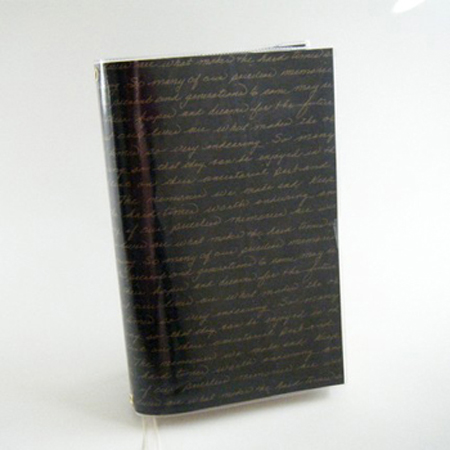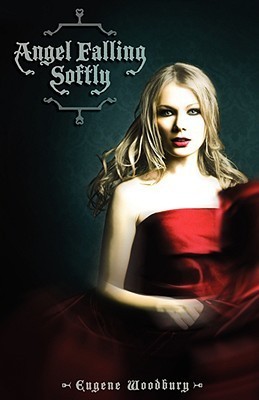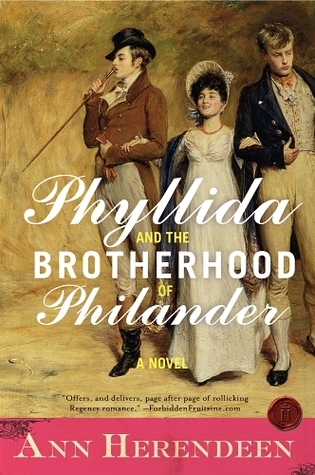The owner of Sexy Little Outfits [dead link] has asked me to contribute snippets (some clothing-related, some not) from The Proviso for the “Sexy Stories” [dead link] part of her site. She’ll be putting up one a week for the next several weeks, so don’t miss out!
Read more
I gotta get me one’a dese
 Hide-a-Book [dead link]. For keeping your deliciously wicked covers under wrap wherever decidedly un-wicked people will be staring at you funny.
Hide-a-Book [dead link]. For keeping your deliciously wicked covers under wrap wherever decidedly un-wicked people will be staring at you funny.
Just because they’re so dang purty.
Reading against type
This morning I’m listening to Simply Red (flashbacks from freshman year at BYU) and the song “Money’s Too Tight to Mention” is a good song. If it weren’t, I wouldn’t have it in my library.
It also trashes things I believe in. Does it bother me? On some visceral level, yes, but that doesn’t make it difficult for me to listen to it and it certainly doesn’t keep me from listening. I’d miss a whole lot of good music (and that voice!) if I took umbrage at other people’s opinions and the way they state them (usually the way they state them is more off-putting than what they say).
So it started me thinking about how I read fiction,
Bettie Sharpe’s “Ember”
 In my opinion, this is not so much a twisted fairy tale as an example of how to write. I won’t get into all the gush-deconstruction with various adjectives and superlatives because it’s been done ad nauseam (by an agent, even!)
In my opinion, this is not so much a twisted fairy tale as an example of how to write. I won’t get into all the gush-deconstruction with various adjectives and superlatives because it’s been done ad nauseam (by an agent, even!)
Bettie, if you see, this, please email me your Paypal account and I’ll PAY you for the privilege of having read it.
Thank you, Stephen King.
I stopped reading you when I was 17. There was a reason for this: I’d run through everything you’d ever written by that time and I was burnt out on you, so I went on to glomming my next author, whom I have also never read again. Lather, rinse, repeat throughout my life. Glom, abandon, glom, abandon. Yes, I am an evil reader.
“Eventually you will succeed.”
Does anybody actually believe this without a boatload of qualifiers?
Over at Romancing the Blog, there was a very nice article about a mystery writer’s convention comparing and contrasting how that genre’s culture stacks up against the romance genre’s culture (including ebooks, my pet topic, but I’ll pimp that later elsewhere). I found this tidbit interesting:
The motivating keynote and luncheon speeches sounded just like the ones we hear at RWA, discussing how important it is to write your story, to finish the book, to be persistent, hone your craft, and if you keep at it, eventually you will succeed.
Er, no.
I rode this train for so long … why?
I have a buncha novels on my hard drive that have been sitting around collecting dust since, oh, 1990 some time, I guess. In ’93 I wrote one that got me an agent another that year that got me a contract—before they were shut down (because, according to the rumor at the time [get this] it was making too much money and it had been created to take a loss for tax purposes) (remember Kismet? Anyone? Anyone? Bueller? Bueller?) [dead link]; one in ’95 that got me an early-Saturday-morning phone call from Harlequin to pleasepleaseplease overnight the manuscript; and a fourth novel in ’98 that got me a different agent.
Hatchet, ax, and saw
In the last week or so, it has become clear to me that the basic understanding quite a few people have of libertarianism is that of greed and selfishness. This surprises me because I thought most people had us figured for proponents of legalized marijuana and prostitution.
Book Review: Angel Falling Softly
 Angel Falling Softly
Angel Falling Softly
by Eugene Woodbury
published by Zarahemla Books
Perhaps I should admit upfront that I consider myself an undemanding reader. I’ll happily go wherever the author wants to take me as long as it’s logical, consistent, and interesting. Let me add that I don’t even particularly care whether a story is plot-driven or character-driven; give me something to chaw on intellectually and I’m good to go. Make me laugh and I’ll forgive almost anything.
This is one reason why, when I read Stephenie Meyer’s Twilight, I was highly annoyed [private link]. I like vampires. I’ve studied vampire myths since I fell in love with Vlad the Impaler somewhere in the early ’90s, so her inconsistent worldbuilding, her habit of telling rather than showing, and her mostly flat characterizations grated.
By contrast, Eugene Woodbury’s take is haunting. Poignant, even.
Speaking of politics…
My husband and I went to see Rush last night. We had AWESOME seats.
There were two age demographics: late 30s and up and … their kids. The youngest I saw was sevenish, but if there was anybody there between the ages of mom-and-dad-forced-me-to-come and 30, I didn’t see them.
It was the most sedate audience of a hard-rockin’ concert I’ve ever been to, but then, most all of us were old and fat. No matter. By halfway through the second half I was ready to get laid.
Niches are nice, but…
I started a new book a couple of days ago. It’s easy when you start ripping off plots on purpose instead of trying to reinvent the wheel and then finding out someone else did it before you. First Hamlet, now the New Testament. Next thing you know, I’ll be rewriting Moby Dick.
Now, I can write for a Mormon audience. Or I can write for the romance audience. Or I can write for the general fiction audience (whatever that is). Well. I wrote for all three, because that’s what I like.
I am so getting this book
 Phyllida and the Brotherhood of Philander
Phyllida and the Brotherhood of Philander
by Ann Herendeen
Yeah, so I’m not really all about the bisexual historical romance (“a man in love with his wife and his boyfriend”), but what I am about is when self-publishing serves its purpose, which is to say, it gained an audience and a traditional NY publisher’s attention.
What the hell is Mormon romance?
So I went a-seekin’ keywords for my website header information and, naturally, plugged “Mormon romance” into Google and what did I get? This:
Mormon romance novels seduce book buyers
Germane point:
“I realized that there was a big hole in the LDS market for women’s fiction and I felt like I could do better,” [author Anita] Stansfield said. “I couldn’t find anything to read that satisfied me.”
Several years ago Stansfield wrote about a woman recovering from breast cancer. An important part of the book was the woman’s relationship with her husband, which included their relations in the bedroom, Stansfield said.
The novel’s bedroom scene dealt sensitively and obscurely with the topic of sex, referring more to the woman’s feelings than the couple’s activities. And yet Stansfield doesn’t believe those scenes would make it through the editing process today.
“I know I couldn’t write that now. They have cracked down,” she said.
WTF?
Go West!
Self-publishing isn’t a new thing. Some of the world’s classics were self-published, although I’m not so arrogant as to think I rank up there with the likes of Mark Twain, Elizabeth Barrett Browning, Willa Cather, e.e. cummings, and Alexander Dumas.
However, it’s new to me. When I was trying to get published back in the ’90s, self-publishing (then only vanity publishing, really) was not only expensive, but the kiss of death. Now … not so much. With concepts such as ebooks, print-on-demand, and the internet itself, the technology is there to do it quickly, relatively cheaply, and to one’s satisfaction (i.e., artistic control). Filmmakers have been doing this for years as have musicians.
I’ll not go into all the reasons I decided to do this myself, but this post by agent Lori Perkins validated my decision to do so.
I’m all about DIY, free markets, and workaround solutions. No, I won’t have a print run of 175,000. Hell, I won’t even have a print run, period. But I think I have a good product that will never see the light of day unless I take the initiative. My hat’s off to those who’ve gone the traditional route. Either I suck as a writer or I’m too far out in the stratosphere.
And I don’t suck as a writer.
